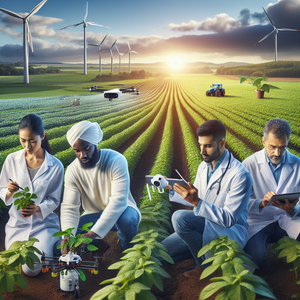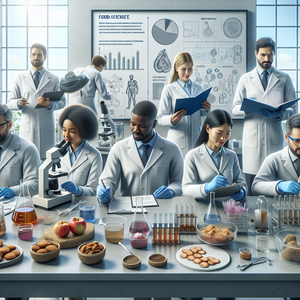
Explore Thriving Career Opportunities in Agricultural Science: Roles, Insights, and Trends
Agricultural science is a vibrant and evolving discipline that marries biology, environmental studies, and advanced technologies to enhance food production and sustainability. As the agriculture sector adapts to global challenges such as food security and environmental concerns, career opportunities within this field are expanding in exciting ways. This article aims to provide an in-depth exploration of diverse career paths in agricultural science—ranging from environmental specialists and agricultural consultants to food scientists and beyond. Each of these roles is essential in tackling modern agricultural issues, whether it’s optimizing farming techniques, ensuring food safety, or promoting sustainable practices. By delving into job descriptions, educational requirements, and market trends, this guide seeks to equip aspiring professionals with the necessary knowledge to navigate this essential industry, with particular insights for regions like Louisiana.
Job Summaries:
Environmental Specialist:
- Environmental specialists play a pivotal role in evaluating how agricultural practices impact ecosystems.
- They conduct environmental assessments, pinpoint pollution sources, and craft strategies to minimize adverse effects.
- A bachelor’s degree in environmental science or a related field is typically required.
- Adept data analysis skills and familiarity with environmental regulations are essential.
- By aligning agricultural practices with sustainability goals, these specialists help safeguard our natural resources.
- The demand for environmental specialists is on the rise, fueled by stricter regulations and the growing emphasis on sustainable agriculture.
Agricultural Consultant:
- Agricultural consultants offer strategic guidance to farmers and agribusinesses, enhancing productivity and sustainability.
- They analyze farm operations, recommend best practices, and assist in resource management.
- A degree in agricultural science or a related field is usually necessary, alongside strong analytical capabilities.
- Their expertise is vital for improving production methods and ensuring the economic success of farming operations.
- Market Outlook: With the ongoing modernization of agriculture, skilled consultants are increasingly sought after, presenting numerous opportunities in both rural and urban areas.
Food Scientist:
- Food scientists focus on enhancing food quality, safety, and production processes.
- They investigate preservation methods, safety protocols, and nutritional values, often collaborating with food manufacturers.
- A degree in food science or a related discipline is crucial, along with a solid foundation in chemistry and microbiology.
- Food scientists are essential in addressing consumer health concerns and advancing food technology.
- Market Outlook: The food science sector is witnessing growth, especially in food safety and innovative product development areas.
Farm Manager:
- Farm managers oversee the daily operations of farms, ensuring they run efficiently and profitably.
- Responsibilities include labor management, equipment upkeep, and financial planning.
- Implementing crop rotation and pest control strategies is also part of the job.
- A degree in agricultural science or business management is typically required.
- Strong leadership skills are essential for effective farm management.
- Effective farm managers maximize yields and ensure the long-term viability of farms.
- The demand for skilled farm managers is expected to rise as farms adopt new technologies and sustainable methods.
Soil Scientist:
- Soil scientists assess soil health and composition to boost agricultural productivity.
- They conduct field studies, analyze soil samples, and provide recommendations for amendments or management practices.
- A degree in soil science or agronomy is essential, along with proficiency in data analysis.
- Their work is critical in maintaining soil health, which is foundational to sustainable food production.
- Market Outlook: With a heightened focus on sustainable agriculture, the need for soil scientists is becoming more pronounced.
Agricultural Engineer:
- Agricultural engineers design machinery, structures, and systems that enhance agricultural productivity.
- They work on projects that involve irrigation systems, farm equipment, and renewable energy solutions.
- A degree in agricultural engineering or a related field is required, along with strong problem-solving skills.
- These engineers play a crucial role in improving efficiency and modernizing the agricultural sector.
- Market Outlook: The field of agricultural engineering is expanding, presenting numerous opportunities for innovative solutions in sustainable farming.
Agricultural Journalist:
- Agricultural journalists provide coverage of developments, policies, and innovations in agriculture, helping to inform the public and industry stakeholders.
- A background in journalism or communications, combined with agricultural knowledge, is beneficial for this role.
- These journalists are vital in raising awareness about agricultural trends and challenges.
- Market Outlook: As public interest in agricultural issues grows, the demand for skilled agricultural journalists is increasing.
Pest Control Specialist:
- Pest control specialists manage pests that jeopardize crops and livestock.
- They perform inspections, identify pest species, and recommend environmentally safe control measures.
- A degree in agricultural science or entomology is often required, along with pest management certifications.
- This role is crucial for safeguarding agricultural productivity and ensuring food security.
- Market Outlook: The pest control industry is expanding, driven by an increasing awareness of sustainable pest management practices.
Animal Scientist:
- Animal scientists focus on improving livestock production practices by researching genetics, nutrition, and breeding techniques.
- A degree in animal science or veterinary medicine is necessary, along with strong analytical skills.
- These professionals are committed to ethical practices in animal husbandry and contribute to the sustainability of livestock agriculture.
- Market Outlook: The demand for animal scientists is projected to grow as the livestock sector aims to enhance productivity and animal welfare.
Horticulturist:
- Horticulturists specialize in the cultivation of fruits, vegetables, flowers, and ornamental plants.
- They leverage their knowledge of plant biology and ecology to optimize crop yields and quality.
- A degree in horticulture or a related field is essential, along with practical experience.
- Horticulturists significantly contribute to food production and biodiversity.
- Market Outlook: The horticulture industry is flourishing, driven by consumer demand for fresh produce and ornamental plants.
The realm of agricultural science is brimming with career opportunities, each role playing an integral part in the industry's response to pressing global challenges. From environmental specialists promoting sustainable practices to food scientists ensuring food safety, the variety of professions reflects the critical role agriculture plays in society. Aspiring professionals should explore job openings and keep abreast of market trends as they consider their future in this dynamic field. With the agricultural landscape continuously evolving, the demand for skilled individuals in agricultural science is likely to grow, creating a wealth of opportunities for those looking to make a meaningful impact in this essential sector.
Explore More Jobs

